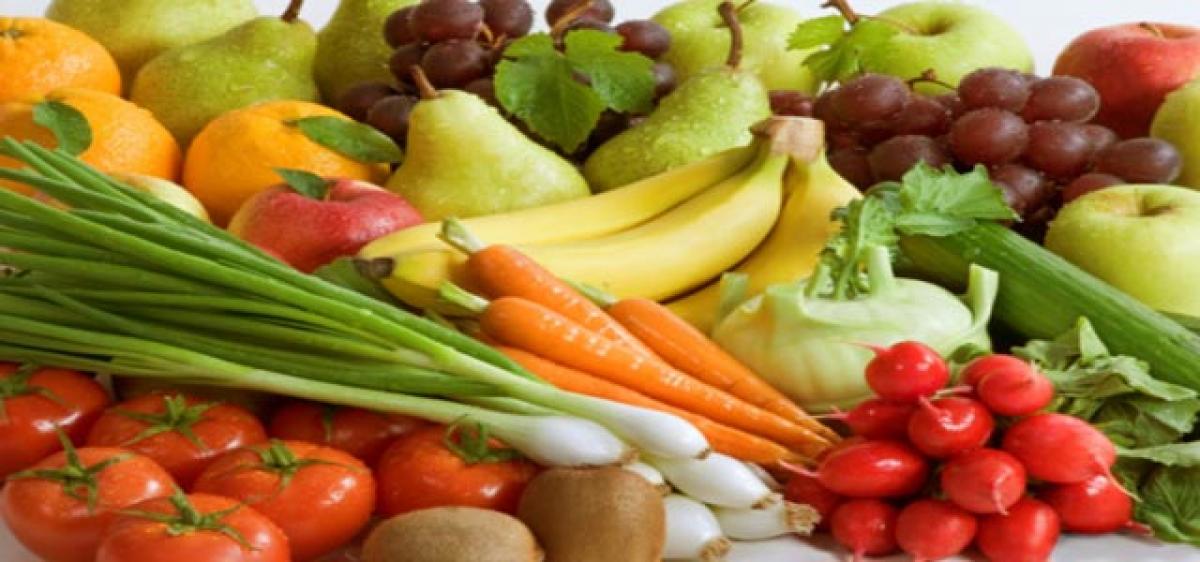Live
- 6.79L homes to receive water under Amrut-II
- Cops prohibit assembly of 5 or more near Group-II exam centres
- Avanthi, Grandhi quit YSRCP, lash out at Jagan
- Dharani portal services paused till Dec 16
- Komuravelli Mallanna Swamy Jatara from Jan 19
- Study tour for TG legislators soon
- State cabinet expansion by Dec 31: Ponguleti
- 2 Narayanites bag gold medals in IJSO-2024
- Jail superintendent suspended in ailing farmer handcuff incident
- CM Revanth orders probe into farmer’s handcuff incident
Just In
Sharp slump in fruit-vegetable exports prompts long-term remedies


A sharp 18 per cent slump in the exports of fruit and vegetables alone in the past two years -- largely due to a stringent green norm and heightened quality standards, particularly in Europe -- has prompted a slew of long-term remedial measures including improvement in pre-harvest conditions and cluster farming to improve quality.
A sharp 18 per cent slump in the exports of fruit and vegetables alone in the past two years -- largely due to a stringent green norm and heightened quality standards, particularly in Europe -- has prompted a slew of long-term remedial measures including improvement in pre-harvest conditions and cluster farming to improve quality.
"We are working on issues such as grading, cleaning, testing, irradiation to ensure standard quality of fruits to be exported. However, we need to focus on the pre-harvest conditions such as use of fertilizers, pesticides, seeds and supervision to root out the problem of residue. It is likely to take two years to execute the plan," Agricultural and Processed Food and Products Export Development Authority (APEDA) Chairman D K Singh said.
He also said that the concept of cluster farming was also being mulled to obtain produce of a particular variety and uniform quality.
"Fruit produce harvested in different patches or locations differs in quality. If cluster farming is implemented, for example, one variety in entire district, we can get improved and uniform quality. It can enhance chances of export and better returns," Singh explained. APEDA has held several meetings with the Agriculture Ministry in the last few months to decide ways to adopt these proposed changes.
"Once we formulate the plan, we will approach the state governments and, subsequently, Farmer Production Organisations (FPOs) -- member-based institutions of farmers-- to execute it," Singh said. All this is largely the result of the European Union tightening its regulations on Maximum Residue Level (MRL) of pesticides, as also upping its quality standards.
What has sent the alarm bells ringing is that the export of all agricultural commodities -- horticulture, fresh fruits and vegetables, processed products, cereals and animal products -- dropped 34 per cent from 30,001,358 MT in 2013-14 to 19,942,256 MT in 2015-16.
In 2013-14, 2,917,405 MT of fruits and vegetables were exported, which came down by 14 per cent to 2,500,961 MT in 2014-15. The fall continued in 2015-16 when exports were only 2,404,945 MT, a decrease of four per cent compared to the previous year and 18 per cent compared to 2013-14. According to APEDA data, exports of fresh mangoes touched 41,279.97 MT in 2013-14, increased by four per cent in 2014-15 but fell 15 per cent to 36,329 MT in 2015-16.
Similarly, export of grapes has come down from 192,616 MT in 2013-14 to 156,218 MT in 2015-16 while walnut registered a heavy decline from 6,726 MT in 2013-14 to 2,665 MT in 2014-15, but rose slightly to 3,291 MT in 2015-16.
Delhi based exporter Rafi Ahmed said that complex government rules and policies were to blame for the slowdown in the business. "There has been slowdown in the export of all agriculture commodities in the last few years. However, the government has not taken enough steps to boost it. Demonetisation may also play spoilsport. We can only hope for best now," Ahmed said.
By Saurabh Katkurwar

© 2024 Hyderabad Media House Limited/The Hans India. All rights reserved. Powered by hocalwire.com






